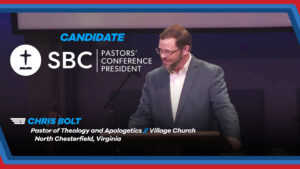
NASHVILLE, Tenn. (BP)–After years of decline, gifts to the Southern Baptist World Hunger Fund grew by over five percent in 1996. Hunger giving rose from nearly $6.7 million in 1995 to over $7.1 million in 1996.
The increased rate of giving appears to be setting a new trendline upward, said Donoso Escobar, director of church and community ministries for the Southern Baptist Home Mission Board. He noted hunger receipts for the HMB are up 45 percent for the first two months of 1997 compared to the same months in 1996.
“The additional receipts enabled us to respond swiftly to emergency hunger situations,” Escobar said, explaining many of the funds went to aid flood victims in California, Kentucky, and Indiana. The Home Mission Board reported over 8,600 conversions last year directly related to HMB-directed hunger ministries.
Gifts to the SBC World Hunger Fund are distributed between the Home Mission Board and the Foreign Mission Board according to long-established agreements within the convention, 20 percent to the HMB and 80 percent to the FMB, unless the donor designates otherwise.
“I praise God for the continuing response of Southern Baptists to the hungry people of the world,” said Richard Land, president of the Southern Baptist Christian Life Commission. The CLC is responsible for raising awareness of Southern Baptists to the hunger issue.
“Each of us can do something, and with God’s help, working together we can accomplish much in Christ’s name,” said Land, noting 100 percent of the gifts to the World Hunger Fund received in Nashville goes directly to hunger relief.
While expressing appreciation for the increase in gifts, an FMB specialist in hunger relief said the need worldwide remains enormous.
“While we are grateful for the increased giving in 1996, we challenge Southern Baptists to an even greater vision. On average, Southern Baptists continue to give less than one dollar per member to world hunger relief,” said Bill Cashion, FMB’s human needs consultant.
Cashion said when Southern Baptists fail to give, opportunities to share the gospel are missed, saying an invitation given by the South African government to expand an FMB vocational training program across South Africa was declined by the FMB due to a lack of funding. Cashion said the program, which began in Soweto, prompted a new church start in that city.
“Recently, I was able to see with my own eyes the importance of ministry evangelism during a trip to Bosnia,” Cashion said. “In 1996, Southern Baptists provided $240,000 for hunger relief in Bosnia and 10,000 people received food through four food centers over a six month period. In addition, at least 20 Bible studies have started across Bosnia.”
Testimonies abound of the effectiveness of hunger ministry in opening doors for sharing the gospel, he said.
While delivering seeds and fertilizer as well as dry beans for eating to a remote area of Zambia last August, SBC missionary Fred Allen and his team of national Baptists were stranded across the half-mile wide Zambezi River when the local pontoon ferry broke down. During their four days of waiting to cross the river, the group passed out hundreds of gospel tracts and witnessed to countless people, Cashion said.
“Over 200 people were saved, 87 baptized, and two new fellowships were started,” Allen said, adding the ferry driver now leads a Bible study in that area.
Many Baptists are unaware that missions offerings and the Cooperative Program do not fund the over 200 hunger ministries Southern Baptists operate worldwide, Cashion said. “The only provision for these ministries is through the Southern Baptist World Hunger Fund.”
–30–















